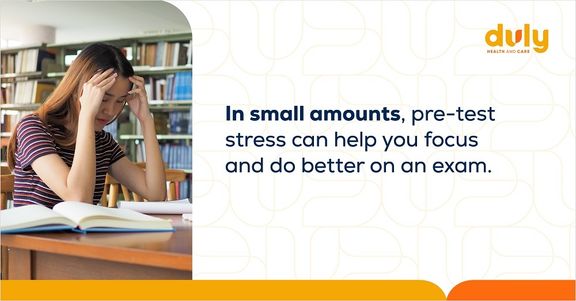It’s the end of the semester. A nice long break is within arm’s reach. There’s just one thing standing between you and your vacation. Finals.
Whether you’re preparing for finals with a carefully crafted study schedule or with a last-minute cram session, stress during finals week may as well be a rite of passage.
It’s not all bad news. A little bit of stress during finals can actually be beneficial.

However, finals week stress can take a toll on both your well-being and how you perform on your tests. Here’s what you need to know about final exams and stress as you hit the books.
Finals Week Stress Is Acute Stress – Not Chronic
Acute stress is short-term stress that occurs because of a specific situation, like being in the throes of finals week. It typically doesn’t have a long-term impact on your health.
Chronic stress, on the other hand, lasts for a few weeks or more. Unlike acute stress, it can increase your risk for health issues if left untreated, such as:
- Anxiety or depression
- Trouble falling or staying asleep
- Exhaustion
- Stomach or digestive problems
- Diabetes
- Heart disease
- High blood pressure
- Obesity
- Skin problems, like eczema or acne
- Weakened immune system
Also read: Chronic Stress Is Making You Sick
It’s Important to Take Finals Week Stress Seriously
Since acute stress doesn’t usually affect your health, you may be wondering about the point of managing it.
It’s very easy to slide from “just a bit stressed” to feeling completely overwhelmed. If you keep having repeated bouts of acute stress, you might get inflammation in your circulatory system (which can increase your risk for heart disease). And if stress builds up and lingers, it could eventually become chronic stress. While preventing chronic stress isn’t always possible, nipping acute stress in the bud could decrease your likelihood of becoming chronically stressed.
Also, there are some situations, like if you already have certain medical conditions, where acute stress can affect your health. For example, acute stress can trigger an asthma attack. Acute stress may also cause rapid breathing, which can lead to panic attacks in people who are prone to them.
If you need help managing stress, schedule an appointment with a Duly Health and Care behavioral health provider or your primary care provider.
Managing Stress Can Mean Better Grades
Managing stress doesn’t simply make you feel better or boost your mood. Focusing on stress management while you’re studying for finals could actually help you improve your scores. There are several reasons why this may happen.
- Even acute stress can cause insomnia. Insomnia can cause difficulty concentrating or remembering facts, which are critical during exams. Some studies have even found a correlation between getting a full night’s sleep before taking a test and better grades.
- Acute stress might not have lasting health effects, but it can cause temporary problems like stomachaches and headaches. It’s difficult to concentrate when you’re feeling less than your best.
- Stress management is an invaluable life skill. Learning how to handle stress during finals can help you manage it in similar stressful situations later, whether it’s your next round of finals or a major presentation at work.
Also read: How Does Stress Affect The Body? Take This Quiz to Find Out!
There Are Many Ways to De-stress
Methods of stress management vary from person to person, so the possibilities are endless. You may have to try a few different techniques to find the ones that work best for you.
Some ways to manage finals week stress include:
- Take brain breaks. Putting your books away and closing your eyes for a few minutes or simply going outside to change your scenery can help you reduce stress and refocus.
- Get moving. You may not have time for a full workout, but you can do “mini” exercise breaks. Do jumping jacks, go up and down the stairs a few times, or put on your favorite song and dance it out.
- Try mindful breathing or a short yoga or meditation session.
- Limit social media use to less than 1 hour per day.
- Avoid stress eating. It can be tempting to chow down on candy and chips while studying, but they can cause blood sugar spikes and crashes. Plus, getting into the habit of stress eating can lead to weight gain down the road.
- Eat foods that are known to help reduce stress, such as salmon, eggs, and foods high in dietary fiber (like fruits and veggies, beans, nuts, and seeds). Stay away from alcohol, caffeine, and foods high in sugar or trans fats.
Also read: 6 Ways to Reduce Stress for a Healthier Heart
Know When to Get Help
Feeling stressed during finals week doesn’t necessarily require treatment. As long as you know how to manage stress and it doesn’t last long, you probably are fine handling it on your own.
But if you continue to feel stressed and it starts to inch toward chronic, it may be time to get professional help. Having several of these symptoms for more than a few weeks could indicate that your stress has become chronic:
- Irritability
- Panic attacks
- Aches and pains (e.g. Body, belly etc.)
- Appetite changes
- Low energy
- Avoiding social situations
- Changes in how you respond emotionally to others
- Frequent sadness or anxiety
- Increased drug or alcohol use
There are also some situations where acute stress is so severe that it does require immediate treatment. If your stress has reached the point where you are having thoughts of suicide or self-harm, get care right away.
Be Kind to Yourself
It’s easy to get down on yourself during finals week if you’re struggling to understand or remember things, or if the score on your final will determine your grade for the class. It’s important to not give up – but in the midst of your studying, remember to give yourself some grace.
Health Topics:





